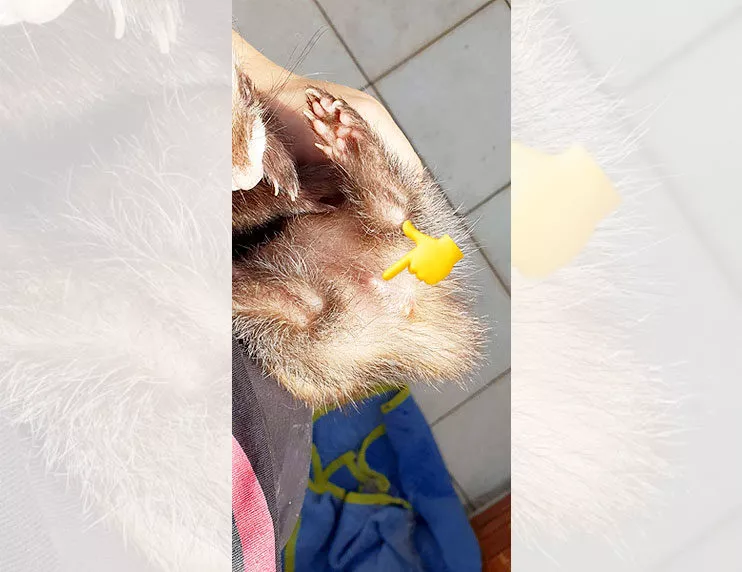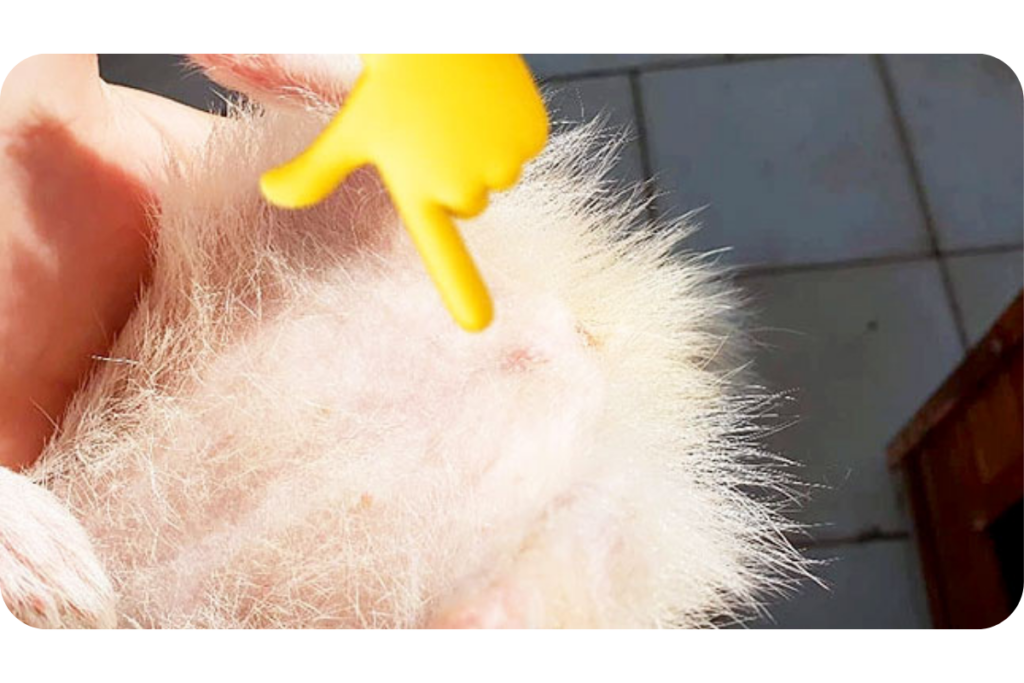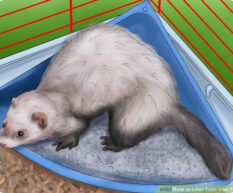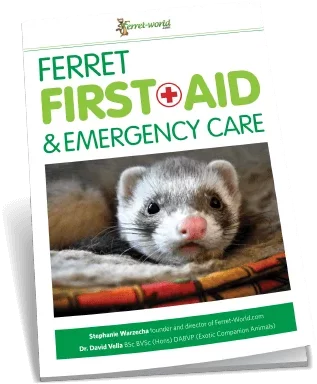Ferret News
Why is my ferret’s vulva swollen?
By Samantha Fixmer


Imagine you are cuddling your little fuzzy girl and notice that her vulva is red and swollen. What could be causing this swelling and how can it be fixed? According to Dr. Robert Dahlhausen of Avian & Exotic Medical Center, the number one cause of vulvar swelling that he and his colleagues see in ferrets is adrenal disease. The second cause is a ferret entering estrus, meaning she is “in heat” or ready to mate.
A quick note about vocabulary: the estrous cycle refers to the reproductive cycle for ferrets and other non-human mammals. The estrous cycle begins with a stage called proestrus, during which the endometrium and ovarian follicles develop. The second stage of the estrous cycle is estrus, which is characterized by sexual receptivity.
What is a vulva?
Female ferrets, like female humans, have external and internal sexual organs. The vulva refers generally to the external parts. The vulva is located just above the anus; you’ll want to have your ferret on her back to look for it. Normally, a ferret’s vulva can be difficult to see because of the small size of the vulva and her fur. It might look like a little pink nub (see the photo of Sage in this article). A swollen vulva will be pink and puffy; some people think it looks like a football or a peanut. A swollen vulva is much easier to see because of its color and size. (See the photo of Daisy for an example of a swollen vulva.)
Adrenal disease
Adrenal disease is the excessive secretion of sex hormones by enlarged adrenal glands. The disease can lead to the development of a benign cancer that slowly progresses to a malignant cancer. It can be treated with medications or surgical removal of the adrenal glands, a tricky process considering the location of one of the glands next to a main artery (Gruden, 2010). If your ferret is experiencing vulvar swelling along with excessive grooming and hair loss, sexual activity, and/or persistent itching, then there is a good chance she has adrenal disease, especially if she is spayed. Should your ferret be experiencing the aforementioned symptoms, please contact your vet and schedule for her to be seen and treated (Eatwell, 2004).
Entering estrus: time to mate!
If your female is unaltered, there is a good chance that she is experiencing estrus, or heat, which is when there is an increase in sex hormones for procreation purposes. One way to end estrus would be to breed your ferret, and it will end once she’s pregnant. We do not recommend this method, as ferret breeding is difficult and best left to the experts. A female ferret can, however, mate with a vasectomized male, and this will bring the female out of heat without a pregnancy.
Another way to end estrus would be an injection from the vet (Dahlhausen, 2020). A ferret vet can give her a “jill jab,” which is an injection of proligesterone. This option is a useful one, as it does not require another ferret.
If your girl does enter estrus, please know that you MUST take action to bring her out of heat. Ferrets do not cycle in and out of heat without intervention; they are unique in the sense that they must complete the cycle by mating or hormone injection. Female ferrets in heat are uniquely at risk of a condition called aplastic anemia, which can result in death if left untreated.
Taking care of your girl
No matter the cause of the swelling of your ferret’s vulva, once it has been treated, either by your vet or by breeding your ferret, the swelling will resolve slowly. Be sure to keep your ferret’s enclosure clean and ensure the area around the vulva, as well as the vulva, are clean and free of debris. While the vulva is swollen, it is at an increased risk for infection (Dahlhausen, 2020). If you ever notice something out of the ordinary for your ferret, please do not hesitate to contact your vet. The earlier a problem is detected, the better prognosis your ferret will typically have.
Check it out!
Our Ferret-World founder and editor-in-chief, Stef, has published a video about ferret vulvas. Click to enjoy!
Citations and further reading
Dahlhausen, Robert. Telephone interview. February 2020.
Eatwell, K. “Two Unusual Tumors in a Ferret (Mustela Putorius Fur). Journal of Small Animal Practice, volume 45, number 9. Published in 2004. Pages 454-459. (Scholarly article)
Gruden, Vanessa. “Adrenal Gland Disease: Hyperadrenalcorticism.” Ferret Asscoiation of Connecticut. Published in 2010. https://ferretassn.org/about-ferrets/health/illness-disease/common-major-illness/adrenal-gland-disease/. Accessed 16 February 2020. (Web page)
Hill, M.A. “Estrous Cycle.” Embryology. Published in 2020. https://embryology.med.unsw.edu.au/embryology/index.php/Estrous_Cycle. Accessed 16 March 2020. (Web page)
“Jill Jab Booking.” Milton Keynes Veterinary Group. https://www.mkvetgroup.co.uk/jill-jab-booking/. Accessd 16 March 2020. (Web page)
“Neutering and Contraception for Ferrets.” Vets4Pets. https://www.vets4pets.com/pet-health-advice/ferret-advice/neutering-and-contraception-for-ferrets/. Accessed 16 March 2020. (Web page)




